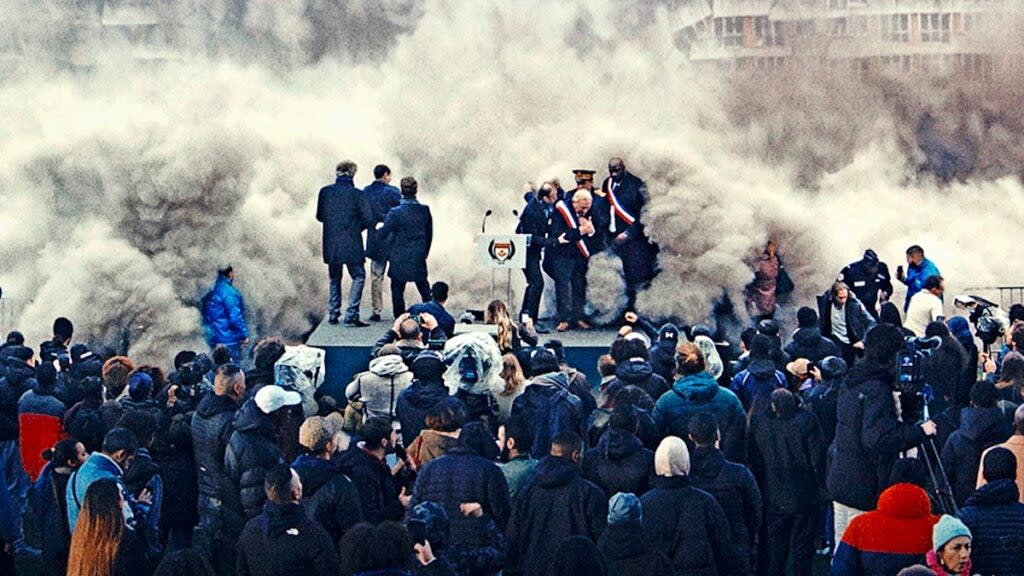‘Les Indésirables’ Review: Ladj Ly Unleashes Another Scorching Drama About French Corruption and Brutality

The title alone suggests what’s in store. Three years ago, French director Ladj Ly burst onto the international scene with his Oscar-nominated “Les Misérables,” a brutally tense and adrenalized drama about the tensions between French police and young people of color in a suburb of Paris. And the fact that his follow-up has a similar title, “Les Indésirables,” suggests that to some degree, we’re in for more of the same.
Well, we are. “Les Indésirables,” which had its world premiere on Friday at the Toronto International Film Festival, isn’t a sequel by any means, but it is also set in a Paris neighborhood largely populated by immigrants and people of color. And it is also a charged look at systematic injustice that runs on anger and packs a wallop.
It does so from the opening sequence, a tour-de-force of hand-held photography that snakes through a decaying apartment block where a family and friends have gathered to mourn the death of a matriarch who has been laid out in a coffin on one of the upper floors of the hulking structure. When it comes time for the funeral procession, a group of men attempt to negotiate the coffin down impossibly narrow stairs – because, one of them says, “the elevators haven’t worked in years.”
Floor by floor, they work to bring the coffin down, traveling through pitch darkness at times, stepping around rubble and debris at other times. Getting down the stairs should be a small thing, but instead it’s monumental — and when somebody mutters, “How can we live and die in a place like this?” the simple question hangs over the rest of the movie.
There’s no overt conflict in the sequence, no arguments or fights — it’s just a group of people trying to perform a simple task that has been rendered all but impossible.
If that opening introduces one side of the conflict that will occupy the film, the next sequence brings in the other side. It’s the ceremonial implosion of a building very much like the one we’ve just seen, a huge apartment block, with the local mayor and other dignitaries on hand to applaud the march of progress. But the explosion is too big, a wave of dust and debris sweeps over the stage and the mayor collapses and dies.
Fans of “Les Misérables” will recognize the official who becomes the new mayor, because he’s played by Alexis Manenti, who was one of the most vicious and corrupt policemen in that earlier film. Here, he looks reasonable at first: he’s a pediatrician and he seems mild mannered, until he begins scheming to institute a right-wing playbook that includes demonizing immigrants and deliberately neglecting apartment buildings so they can be condemned and their residents evicted.
A young local woman who’s being recruited for a post in the city government, Haby (Anta Diaw), discovers some of the plans and decides to run for mayor herself. But things get more corrupt and uglier; if “Les Misérables” zoomed in on a specific conflict between police and community, “Les Indésirables” wades into a chaotic and unfixable morass, a battle on a dozen different fronts.
That makes it a less focused movie, but one that has a cumulative power that grows and grows, particularly at the end of a summer in which protests consumed communities in and around Paris in the aftermath of the police shooting of 17-year-old Nahel Merzouk. (The timeliness also makes the film a prime candidate to be France’s entry in the Oscars’ Best International Feature Film category, where its chief competition includes the gorgeous “The Taste of Things,” formerly “The Pot-au-Feu,” which could not be more dramatically different from Ly’s movie.)
Throughout ““Les Indésirables,” Ly orchestrates the chaos with precision; he makes sure you feel the fury that runs through the community, but as often as not sets it to placid music and spends time in the boardrooms where violence is done quietly, with paper and pens. The movie courses with anger over how the levers of power are used to oppress, but it’s also a procedural that doesn’t milk the situation and remains relatively placid until things erupt.
And yes, they do erupt. There is government brutality on an appalling level, citizens who rebel in shocking ways, but also a pulse that runs through the film insisting on humanity and even beauty. Ly rages, but he doesn’t despair.
“Les Indésirables” is a sales title at TIFF.
The post ‘Les Indésirables’ Review: Ladj Ly Unleashes Another Scorching Drama About French Corruption and Brutality appeared first on TheWrap.

